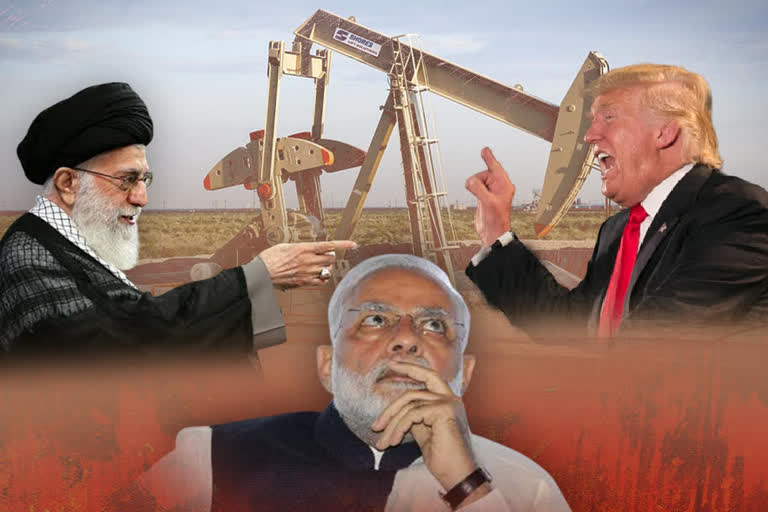Hyderabad: Dramatic turn of events in the Middle East triggered by the killing of Iranian Major General Qasem Suleimani by the US forces have sent shockwaves across the globe, including India.
Oil prices shoot up 4% on Friday touching USD 68 per barrel and is expected to further up going by the preparedness of Trump Administration for further attacks, congratulatory messages from Israel top leadership and retaliation from Iran on US allies in the region.
As this Article is going for publication, there were unconfirmed reports that several blasts shook Baghdad and US flew elite forces to the Middle East.
India is always at the receiving end of tensions in oil rich regions (Saudi Arabia, Iran, Iraq, etc) due to its high dependence on oil imports.
As per an estimate, India meets 80% of its crude oil requirements through imports. As a result, disturbances in the supply chain will make her growth plans go for a toss.
In the aftermath of US sanctions, though Iran is no longer an energy supplier the real threat emanates from the fact that it shares animosity with its neighbours Saudi Arabia and Iraq, which are key energy suppliers to India.
Iraq is the second-largest oil producer within the Organization of Petroleum Exporting Countries, known as OPEC and as per an estimate, its Basra port exported 3.5 million barrels of oil per day in September, which is in the ‘striking range’ of Iran.
Stagflation Worries
The Indian economy is growing at its slowest pace in the last six years.
Quarterly GDP growth, which is a key macro-level economic indicator, has been on a downward path and declined from 8% in April-June 2018 to 4.5% in July-September 2019.
If the current geopolitical tensions continue in coming weeks, the crude oil will touch USD 80 per barrel and, the retail petrol prices may return to October 2018 price of Rs 90/litre in coming months.
Since diesel is major transportation fuel, the overall prices of vegetables would go up further from the already high over 35% price hike in November.
As per a RBI study, for every USD 10 per barrel hike in oil prices, the consumer inflation would be up by 0.49 %.
The researchers duo, Saurabh Ghosh and Shekhar Tomar, of the RBI’s Strategic Research Unit, also showed that an increase in crude oil price worsens the current account deficit (CAD) to an extent that cannot be compensated through a higher gross domestic product (GDP) growth.
As a result, high oil prices would shift the economy into stagflation (growth stagnation + high inflation) mode. This would compel the Central Bank to hike interest rates resulting in tight liquidity and costly EMIs.
Besides, higher CAD to GDP affects the exchange rate. On the news of US attack, rupee plummeted to a month low. If this trend continues it will make our imports costly.
Impact on OMCs
Oil-related stocks, too, declined at the bourses on Friday.
Oil Marketing Companies like Hindustan Petroleum (HPCL), for instance, declined by over 2% in the stock market, while Bharat Petroleum (BPCL) dipped 1.6 per cent to hit an intra-day low of Rs 479.4. and shares of Indraprastha Gas Ltd (IGL), and Indian Oil Corporation (IOC), too, slumped.
Higher crude oil prices margins of above mentioned oil PSUs and Reliance Industries Limited, which owns the world’s largest integrated refinery complex in Jamnagar, Gujarat.
In OMC’s crude basket, 24 per cent and 19 per cent of crude is sourced from Iraq and Saudi Arabia respectively from January 2019 to November 19, while Reliance Industries imported nearly 38 per cent of the total crude from these two countries.
Policy Options for Government
Price-based policies responses determine the extent to which various groups in society bear the cost of the higher prices. The responses can be a mixture of three broad strategies - pass the full price increase on a given product onto final users, finance the subsidy or tax reduction involved through the budget and, lastly, reduce the profits of oil companies.
Reliance on oil can also be reduced by energy efficiency improvement and diversification into non-petroleum sources of energy.
Governments that wish to introduce unpopular policies, such as eliminating subsidies on petroleum products because of their high fiscal burden, have faced opposition to these policies from multiple corners.
Policies that are transparent in motivation, formulation, and implementation are more likely to be accepted than those that are not.
(Article by - Dr. Hiranmoy Roy, Associate Professor & Head, Department of Economics and International Business, School of Business, UPES, Dehradun. Views are personal.)



